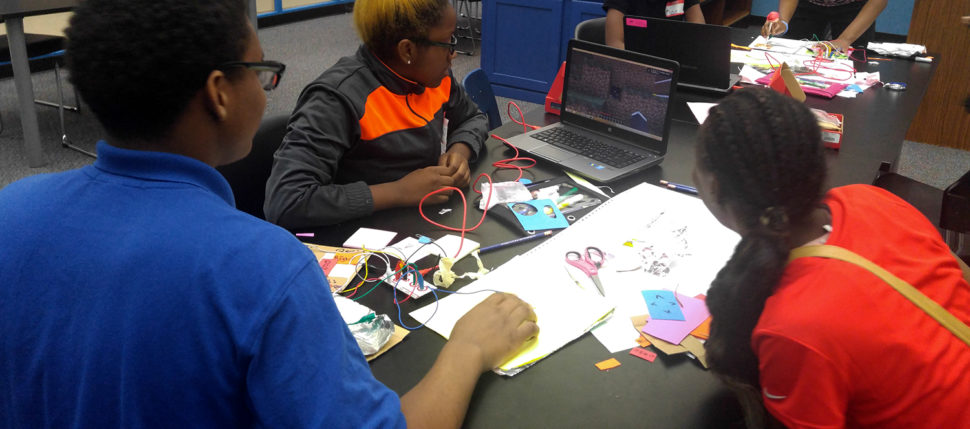
What does project-based learning look like?
Classrooms with students working collaboratively in self-directed groups
Students giving constructive criticism and positive feedback to each other
Students presenting to the city council, local officials or to industry professionals
Transformative approach to teaching and learning that sets up group collaboration in real-world exercises that meet the needs of 21st century learners
Student-centered learning
Project-based learning (PBL) is a student-centered pedagogy that involves a dynamic classroom approach in which students acquire a deeper knowledge through active exploration of real-world challenges and problems. Project-based learning also describes problem based learning and challenge based leaning where projects begin with a particular problem or challenge to solve. Project-based learning provides context to learning and offers students opportunities to grow noncognitive abilities as well as academic abilities.
Research shows better learning
Studies comparing learning outcomes for students taught via project-based learning versus traditional instruction show that, when implemented well, project-based learning increases long-term retention of content, helps students perform as well as or better than traditional learners in standardized tests, improves problem-solving and collaboration skills, and improves students’ attitudes toward learning (Strobel & van Barneveld, 2009; Walker & Leary, 2009). Project-based learning can also provide an effective model for whole-school reform (NCCSR, 2004; Newmann & Wehlage, 1995).
Schoolwide implementation
While individual teachers can get started with the process by teaching through projects to enhance learning, project-based learning is most effective when adopted in a schoolwide implementation. Starting with district support and campus leadership, project-based learning has the most impact it is when adopted and implemented as a systematic and fundamental change in teaching and learning.
Research shows the campus will benefit most by having a carefully calibrated plan to adopt project-based learning, by setting up a common planning time for teachers, and by being fully supported with ongoing professional development and coaching.
FAQs
What are the benefits of teaching through project-based learning?
Project-based learning gives students an opportunity to learn in a group setting with a common goal that ends in a presentation to a real-world audience, which helps increase students’ noncognitive abilities. Teaching through project-based learning can increase student confidence, increase assessment scores and, most importantly, gives students a purpose for learning and applying new concepts.
Can project-based learning be used to teach all learners?
Teaching through projects gives teachers more flexibility, which provides more time for individual differentiation. The role of the teacher becomes focused on facilitation instead of the traditional direct teach method. Project-based learning can easily be implemented in K-12, but is more commonly seen in 5th-12th grade.
Is project-based learning only for math and science?
The early adopters of project-based learning have been STEM academies and specialized magnet schools, but they have paved the way with research and practice that shows that project-based learning can be effectively utilized in any subject. Project-based learning lends itself to cross-curricular connections in teaching and is seen as multidisciplinary in implementation.
Is project-based learning affordable to implement?
The cost associated with changes to curriculum and lesson design varies by publisher and provider, but project-based learning is more than just a new curricular program, it is a dynamic change in thinking and is a paradigm shift in practice. Adopting project-based learning is an investment in the future of students’ lives and opens opportunities to students that reflect the needs of the 21st century.
IDRA services to support project-based learning at your campus
IDRA can work with your campus to design a PBL Implementation Plan, identify needs and support project-based learning through professional development and coaching.
Year One – Exploratory Phase
- Develop an implementation plan with assistance from IDRA
- Train all staff on quality project-based learning pedagogy and practice
- Support teachers in developing and implementing two to four projects during the year
- Ongoing PBL coaching
Year Two – Development Phase
- Additional professional development, focus on assessment and outcomes
- Support teachers in developing and implementing four to eight projects during the year
- Ongoing PBL coaching
Year Three – Full Implementation
- Additional professional development, focus on teacher efficacy
- Support teachers in developing and implementing projects all year
- Ongoing PBL coaching
Each phase includes a minimum of the following services:
- 1 day of planning with leadership
- 5 days of professional development (3 in the summer)
- 6 days of PBL coaching
Resources
See our webinar: First Steps in Project-Based Learning that answers some of the most common questions about planning, implementation and best practices for project-based learning.
See our webinar, PBL at Home & Across the Curriculum, focusing on how through hands-on experiences, students can explore, create, engage and connect what they are learning to the real world.
See our infographic: 8 Elements of PBL Lessons.

